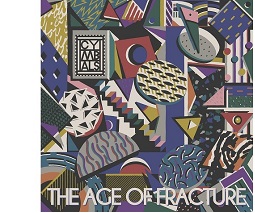This LP does what Étienne de Crécy’s music did in the late ’90s, openly identify and celebrate the here and now; or what New Order used to do, sugar coat the grimy, unpalatable stuff, with a bit of dry humour.
This LP does what Étienne de Crécy’s music did in the late ’90s, openly identify and celebrate the here and now; or what New Order used to do, sugar coat the grimy, unpalatable stuff, with a bit of dry humour.

(Tough Love Records) http://www.konkurrent.nl
A great record this, full of space and possibility. And whether what it stands for is solid or whether it just melts into air, isn’t really a concern when you’re listening in. Despite the obvious nod to Daniel Rodgers, The Age of Fracture is primarilly concerned with concocting a soundtrack for a good time. Right from the opener Winter 98 the band looks to tug at the heartstrings with glossy, poppy and upbeat music, the sort of sound that is an antidote to existentialist gloom. And is that a cocktail party that introduces the record? We can only guess. Maybe the LP’s relentless outward facing is a good buffer for us to shield behind and take succour from; some of the hooks on Erosion and You Are, for instance, are infuriatingly catchy and I’ll place a bet here and now that these tracks will be utilised “across the board” by the very “machine” Cymbals seek to reify; from cuddly sofa/supermarket/car insurance commercials to the incidental music on Match of the Day.
Outside of the instrumental closer, Call Me (which I was convinced would be the Blondie track given the rest of the LP’s content) this is a relentlessly upbeat, often happy-feeling record; classic pop in parts and always looking to keep things simple. Which is, on reflection, a little bit curious, seeing that (we we have seen elsewhere and previously) this band draws ideas from plenty of “source material” that delineates “the opposite point of view”; including Magic Mountain and The Age of Fracture. Still, Cymbals do is what all good dance acts do; they allow the melody at the centre of the track to pull you up and then – guess what – let you gently down. Even when we get quieter moments as in This City, there’s still an effervescence, a simple and rugged positivity that can’t help but bubble over into the general vibe.
And when you hear tracks like The End, The Natural World, or the glorious Like An Animal, you quickly realise that the message, however portentious, is going to be carried by a bunch of sturdy, glossy tracks, able to take a fair number of bumps and built for heavy rotation in a city centre club. It’s neon music, built to be played in cars or in the drive thru queue at Maccy Dee’s. This LP does what Étienne de Crécy’s music did in the late ’90s, openly identify and celebrate the here and now; or what New Order used to do, sugar coat the grimy, unpalatable stuff, with a bit of dry humour. After all, quoting “nothing is as simple as we want” from Like An Animal would be a fun line to chuck in when you order your processed beef clippings and reconstituted, reshaped potato purée from a fast food emporium. It’s this shiny subversion that makes me wonder if Empty Space or The Natural World also look to pick up on where Talking Heads left off around 1988; albeit a strangely glam, Vince Clarke take on Talking Heads’ vibe.
It’s a funny and engaging old jumble. And, always listenable. To quote an old ‘Heads song, “Facts are never what they seem to be / Nothing there! / No information left of any kind / Lifting my head / Looking for danger signs.” But mostly, it’s great stuff. Fab, big bouncy and groovy; albeit with the odd bit of French… ;).
